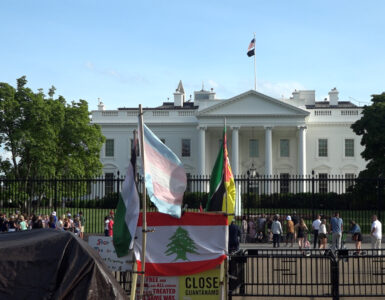Syrian refugees and immigrants, many left their country years ago, report having nearly identical recurring nightmares.
Syrians who do not know one another and have fled to different places around the globe describe repetitive nightmares of imprisonment in their home country. They report having dreams of themselves back in Syria as they try in vain to flee the country they once left.
Shamil Baderkhan, a swimming instructor who sought refuge in the Netherlands, said he has had these nightmares for years.
“I always get stuck in Syria. I wonder how I got there. I wonder how I will get out,” Baderkhan said.
Azza Botrus is an academic administrator at Erasmus University in Rotterdam. She sought refuge in the Netherlands years ago. She says her nightmares resemble the traumatic experiences she witnessed during the first four years of the Syrian conflict.
“As soon as we close our eyes, we are transported to a world of nightmares that haunts us. It never goes away,” Botrus said.
Botrus described the dream as incredibly realistic.
“When I wake up, I feel as if I woke up to a dream. My dream turned into my reality and my reality is my dream,” Botrus said.
The nightmares’ common plot starts with dreamers in the middle of an unexpected return to the country they once fled. They then realize they have lost their Syrian-issued documents while facing the Syrian regime’s security forces at a checkpoint. They often wake up just before the confrontation with the regime they dread most.
“What’s disturbing is that our return to our home country resembles a nightmare. When I see myself there, I wake up terrified,” said Imad Ismail, a teacher who sought refuge in Germany seven years ago.
Checkpoints represent a central theme in dreamers’ nightmares. The Syrian regime set up hundreds of checkpoints in cities and towns.
“I had several experiences at checkpoints. One of them was that a loaded gun was pointed at me for no reason,” Baderkhan said. “I lost several family members who were arrested at checkpoints or in their homes.”
Mohammad Al Abdallah, the director of the Syria Justice and Accountability Centre, said the checkpoints are where many human rights violations are committed daily by the Syrian regime.
“Everybody is scared of checkpoints. A lot of the detention cases, unfortunately, a lot of it ended up in death under torture were from checkpoints,” Al Abdallah said. “Sometimes executions happen at checkpoints and sometimes torture happens at checkpoints themselves.”
Almost 300 checkpoints have been set up just inside Damascus since 2011, according to Al Abdallah.
“Checkpoints are a place where an inspection could be about anything. Open the trunk of your car or open your phone,” Al Abdallah said. “Those are armed people, and you have no option but to comply.”
“When they take your ID. When they run your name in the system. When they give your ID back. The process was severely inhumane,” Ismail said.
Syria witnessed a violent conflict that lasted over a decade and caused over 14 million citizens to flee their homes in search of safety. Almost seven million were displaced inside their own country. Another seven million left Syria.
“I have worked with multiple people who have arrived from Syria, who have been through something extremely traumatic, and then nightmares are happening on a frequent basis,” said Molly Atwood, Assistant Professor of Psychiatry and Behavioral Sciences at the Johns Hopkins School of Medicine.
Researchers believe these nightmares could be linked to post-traumatic stress disorder rooted in what dreamers witnessed during the years of violent conflict.
“When something really threatening has happened, or when you’ve just been exposed to stories of it, it is possible that people can develop post-traumatic stress disorder, Atwood said. “A big part of PTSD is reliving the trauma in some way, either through nightmares or having intrusive memories pop up during the day.”
More than three-quarters of Syrian refugees may be suffering from post-traumatic stress disorder symptoms, according to a 2021 survey conducted by Syria Relief, a UK charity. The study found 84% of Syrian refugees had at least seven out of 15 key symptoms of PTSD.
“In different studies of different kinds of trauma populations, the incidence of post-traumatic nightmares ranges from about 50% of the people that experienced it up to pretty close to 100%,” said Deirdre Barrett, a dream researcher, and psychologist.
The dreamers believe their recurring nightmares are widespread within their communities. Barrett said these nightmares resemble those reported by people who spent time in prison.
“That’s more about just feeling terribly imprisoned in the borders of Syria when you wanted to leave,” Barrett said.
The past few years witnessed a rise in the demands for the forced return of Syrian refugees to their homes, especially in neighboring countries. Dreamers say these nightmares reflect their realistic fears of ending up in Syria.
Amnesty reported that the Lebanese army raided houses occupied by Syrian refugees and deported dozens back to Syria this month.
According to Al Abdallah, a refugee’s return to Syria could lead to their arrest, embezzlement, torture, or even death.
“We are fighting as an institution against any narrative that Syria is safe, and people should go back,” Al Abdallah said.
Amnesty International, Human Rights Watch, and the UN Commission of Inquiry for Syria report that “refugees who have returned to Syria have been subjected to arbitrary arrest and detention, enforced disappearance, kidnappings, torture, sexual violence, and extrajudicial killings.”
“The level of fear in the country, this is a structural institution of arrest, disappearance, and torture. It imposed itself on the country. It is a part of the inherent characteristics of being a Syrian, unfortunately,” Abdallah said.















Add comment